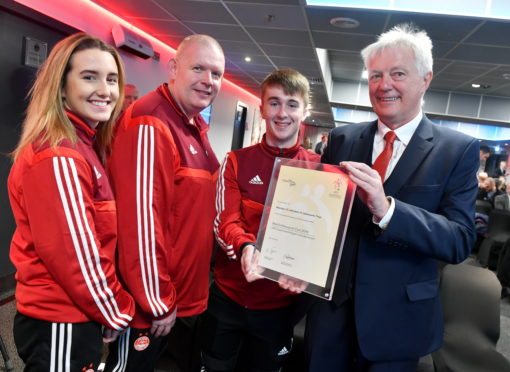They are words which have entered the annals in Scottish football and are ingrained in the DNA of many at Pittodrie.
Alfredo Di Stefano, the great Real Madrid player and manager, was magnanimous after the Dons famously triumphed against the Spanish giants in the European Cup-Winners Cup final in Gothenburg in 1983.
And he hit the nail on the head when he remarked: “Aberdeen are a team that money can’t buy. They have a soul, and a family spirit”.
That community ethos and determination to be an inclusive organisation has been obvious in the manner whereby club members have helped so many people in recent years, both before and during the Covid pandemic.
From the outset, players and officials have striven to assist vulnerable people in the north-east, and have kept in regular contact with those who may be suffering from social isolation or grappling with mental health issues.
Chairman Dave Cormack has been instrumental in promoting the various initiatives developed by the Aberdeen FC Community Trust.
But he would be the first to pay tribute to the commitment and dedication of the AFCCT’s staff and volunteers in changing so many lives for the better and much of that missionary work has been down to the trailblazing efforts and unceasing industry of Duncan Skinner, who died last Friday, aged just 63.
Cormack was one of many people to respond to the sad news with heartfelt condolences and plaudits for his late friend’s accomplishments. He described him as being: “A gentleman who loved life and the Dons. A champion who led the AFC Community Trust to improve the lives of others in the northeast. And a friend who encouraged others.”
Former Open champion Paul Lawrie, another die-hard Pittodrie aficionado, was similarly effusive. He said: “I was gutted to hear the sad news that Duncan Skinner had passed away. He was a great guy who was always very generous towards our foundation and our community.”
It is not unusual for redoubtable characters to play an influential role behind the scenes at clubs such as Aberdeen. One thinks of the decades of service which were proffered – without any thought of honours or personal recognition – by Teddy Scott and the benefits his scouting labours yielded for managers such as Ally MacLeod, Eddie Turnbull and Alex Ferguson.
Yet when the Aberdeen trust was orginally established in 2014, it really was entering uncharted territory; advancing beyond the club environs into parts of the city which were affected by poverty and lack of access to proper facilities.
Skinner was one of the far-sighted individuals who transformed that situation by providing support for people of all ages and backgrounds and espousing the philosophy of football for life, whether it was harnessing the potential of teenage boys and girls in Mastrick, forging partnerships with a multitude of local and national organisations, or responding to the blight of dementia by championing the game as a means of reawakening memories.
None of this has happened by accident and the process will continue in the years ahead. As recent events have demonstrated, sport doesn’t exist in a vacuum, detached from society except on match days. On the contrary, it can be the beating heart of a healthy society, and bring people closer together.
In 2019, Skinner revealed how some pupils had gone from almost never attending school to having among the highest attendance rates as a result of participation in the trust’s programmes.
So too, in conjunction with Aberdeen FC and Aberdeen University, the Mindset programme was created to teach youngsters skills such as communication and resilience to help improve their mental health.
Coaches and local mentors mixed sport activities with “lively discussions” surrounding health and well-being to encourage youngsters to open up and appreciate they were not alone in battling different problems.
Steven Sweeney, the trust’s chief operating officer, said: “This is the very first place in the world that’s having a go at this programme.
“It is about supporting young people to engage with their emotions. This is something which AFCCT cares very much about – we are more than just bibs, balls and markers.”
These are only a couple of the myriad innovative enterprises which have earned the trust plaudits and allowed them to expand their operations.
And even though illness denied Skinner the chance to continue his exertions in the last year, his passion for highlighting the Dons’ links to their city’s residents and pride in unveiling new programmes will not be forgotten.
Jock Gardiner, a member of the AFC Heritage Trust, told me yesterday: “Duncan was one of life’s genuine decent guys, he was humble and hugely supportive of others, in particular young entrepreneurial folk.
“He loved life and the Dons – a keen supporter of the club, both in the boardroom and on the terraces and in his great work championing AFCCT and mentoring many of the people who have devoted their time and energy to this worthwhile charity that has developed significantly in the time that Duncan was involved.”
It’s a genuine success story and Skinner’s contribution to it was pivotal.
